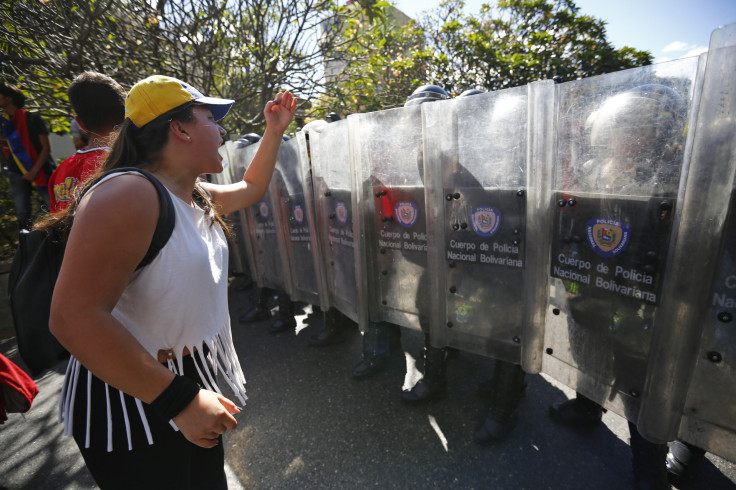Venezuelan Government Allows Security Forces To Use Deadly Force On Demonstrators If They Feel In Mortal Danger

Venezuelan authorities have passed regulations that would allow soldiers to open fire on protesters if they feel their lives are at risk.
The law, Resolution 008610, specifies a spectrum on the use of force, ranging from an “imposing presence” on one end to the use of deadly force on the other. The measure does not distinguish between violent and nonviolent protests. The measure, published in state newsletter Gaceta Oficial, allows the “use of force, with a firearm or any other potentially lethal weapon” as a means to “counter all aggression, immediately confronting it with the necessary measures,” PanAm Post reported.
Defense Minister Vladimir Padrino Lopez, who signed the measure in, cited three months of deadly protests across the country last year as the reasoning behind the law. The Venezuelan ombudsman, Tarek Williams Saab, responding to criticism from civic groups, said the law was “very clear on the progressive and differentiated use of force by law enforcement,” the BBC reported.
However, the law was criticized by civil rights advocates.
"One can never leave to the discretion of a government official, and even less to a member of security forces, to determine on the spot if they deem their life is in danger," Constitutional lawyer Tulio Alvarez told Agence France-Presse.
Marcela Maspero of the National Workers Union said the law constituted “a direct threat to the working class,” adding that the government was increasing acting against the interests of its workers.
The country’s opposition says it plans to denounce the measure to the United States, and called the ruling an attempt by President Nicolas Maduro to scare Venezuelans from protesting amidst a deteriorating economy.
Venezuela’s constitution does not allow firearms or toxic chemicals to be used in controlling protests, but they laws are rarely applied in effect, the Associated Press reported. In 2009, a report by the advocacy group Interamerican Commission on Human Rights said the onus of enforcing order should fall on civilian forces, "since the armed forces lack appropriate training for the control of internal security.”
The law was passed a few days before the first anniversary of protests against the government which took place in several Venezuelan cities. These demonstrations, held in protest of unchecked crime, corruption and shortages of basic goods, frequently erupted into violence, and resulted in 43 deaths and over 3,000 arrests.
Local NGO Public Space said in a report that 2014 was the worst year on record for freedom of speech, and recorded a total of 579 human rights violations last year, up 59 percent from 2013 and Venezuela’s highest in 20 years, the Latin American Herald Tribune reported.
© Copyright IBTimes 2024. All rights reserved.





















